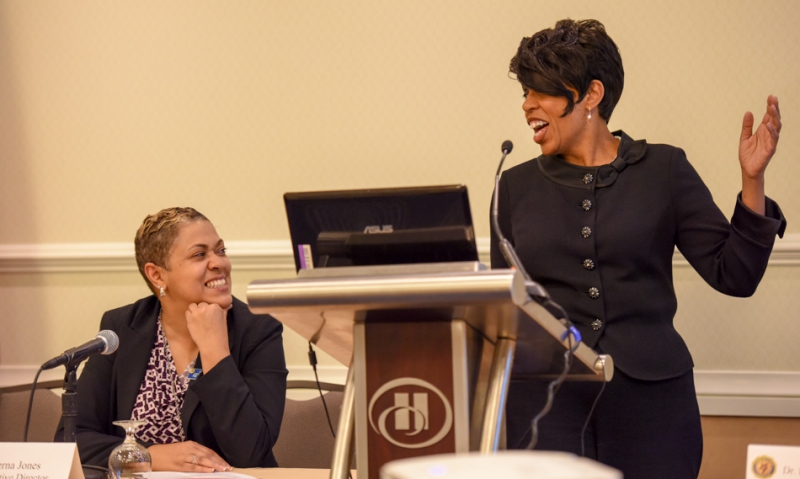
Employment opportunities, emotional and physical wellness topics in panel discussions during Legion's Employment and Empowerment Summit.
Women veterans and military spouses were the focus of two panel discussions that took place Feb. 19 during The American Legion’s Employment and Empowerment Summit leading off the annual Washington Conference.
The panels featured experts from the public and federal sector; the first focused on employment opportunities, while a second covered emotional and physical health.
In the former, USAA’s John DiPiero said a communication barrier exists between veterans and military spouses seeking employment and those hiring.
“You can talk all day about why it’s a good idea to hire veterans,” said DiPiero, USAA’s Military Advocacy Relationship director. “But it’s difficult for that veteran – and that includes veterans’ spouses – to be able to articulate that story to somebody sitting across the table from them during the interview process … there’s going to be a mismatch.
“It’s not based on anything that people mean to do in many cases. It’s just those … biases. We all have them. So on the corporate side, it’s how do we educate ourselves about the military and what they bring to the table. As soon as they start figuring that out, the job of the recruiter gets easier. I saw that happen at USAA.”
Tonieh Moshier, regional compliance leader for IBM, said veterans come out of the military ready to work, but translating their skills into what a potential employer needs can be difficult.
“I’m so amazed at the skill levels when I just look at a résumé,” she said. “It may not be articulated the way we want to see it, but it’s impressive. It is so impressive because all of you bring this unique set of skills. You just have to know how to package it and then map it to the job you’re applying to.
“Your skills are phenomenal, and employers recognize that. We just need you to understand that you have to modify your résumé to meet the job requirement.”
Moshier said résumés have to “be tight. It has to be written very well. It has to be sexy. The words have to pop off the page. You want to say the things that will catch the hiring manager’s eye.”
DiPiero said he always suggests using a job description as a “cheat sheet” for a résumé – understand what the needs are for the job based on the job description and tailor a résumé for that job.
He also said that if you know someone working for a company where you’re applying, don’t be afraid to use those contacts. “It’s how you approach it that matters,” he said. “You don’t go begging for the job. A lot of us veterans feel funny about networking. You’ve got to use your network.”
James Tongate, co-president of Humana, said his company has created its own veteran and military spouse talent portal. “Once (job seekers) are in there and shoot a résumé in there, it goes directly to myself or possibly two or three others,” he said. “They will then get an actual phone call back … explaining what they’re going to experience. They’re actually going to talk to a live person for at least 30 minutes to talk about the culture, the hierarchy at Humana … so at least they have some sort of focus. We’ve been very successful that way.”
A common theme of the second panel was that women don’t often self-identify as veterans. Lt. Col. Paula Smith of Soldiers for Life said women veterans often view themselves in other ways. “We wear a lot of hats,” she said. “That becomes an issue because when you are a veteran, you come to the table with a unique set of characteristics, qualities and skills no one else may. It’s time to celebrate that.”
Dr. Betty Moseley Brown, associate director of the Department of Veterans Affairs’ Center for Women, said that women veterans don’t seek out VA services initially. “We’ve been wives, mothers, we’re caretakers, we’re all the things we need to be,” she said. “And then whenever life settles down, that’s when we call VA to see what our benefits are. That’s really the way it happens.”
Verna Jones, executive director of the Legion’s D.C. office, said VA facilities like the Washington DC VA Medical Center have improved their women veteran facilities to make those patients feel comfortable when they seek out medical care.
“It feels wonderful to go into a facility where people understand who you are and what you need,” Jones said. “Women don’t want a separate VA. What they want is some resources that will take care of us when we come in because we know one size doesn’t fit all."
Dr. Nancy Glowacki, Women Veteran Program manager for the Department of Labor, said there is a difference in how men and women veterans are viewed.
“Men are more likely to be portrayed as heroes, as team players, as very strong candidates for employment,” she said. “Look at the next time you see something pertaining to women veterans. There’s a good chance it’s going to be talking about a victim of something.
“The only way we’re going to change the public perception of who a women veteran is, is if those of us who have served in the military and happen to be female are standing up and saying, ‘I served,’ not only when we need help, but when we’re doing very well.”
- Washington Conference

